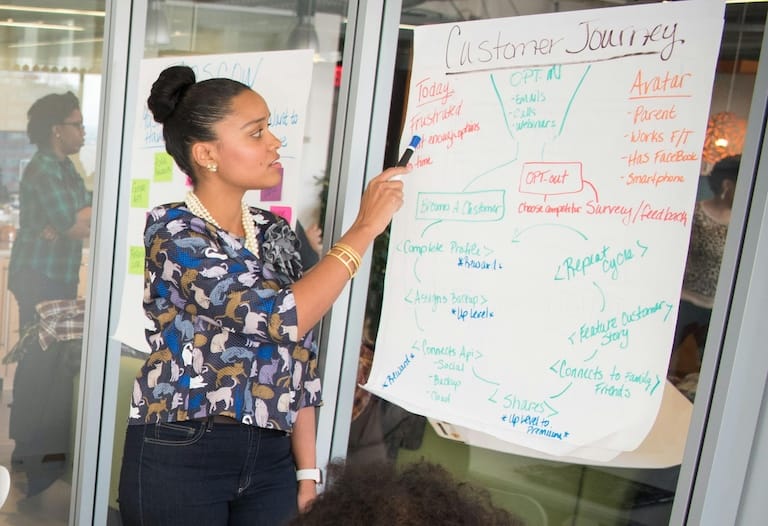
Miriam
May 6, 2025
Rich
May 8, 2025FURTHER EXPERTISE
7 Surprising Secrets for Successful Negotiations
Expert Opinion from Rich Watts published May 6, 2025
Being an effective negotiator is a vital skill to have in the workplace. Whether it’s debating on a project deadline or going back and forth on a multi-million pound contract, having effective negotiation skills can increase the amount of success that you AND the person that you are negotiating with achieve.
This article shares seven surprising techniques that will improve your effectiveness when negotiating. These tips might seem surprising at first, but they are proven to work and are used all across the world by organisations including the FBI!

SURPRISING SECRET NO.1
Do not try to beat the other person
Notice how we have used the term ‘effective negotiator’ rather than ‘strong negotiator’ in this article so far.
Strength often implies overcoming and winning. Great negotiation is not about overcoming or beating the person on the other side of the table. If the people that you are negotiating with regularly feel that they have ‘lost’ when negotiating with you, then the chances are that they will avoid dealing with you in future. The result could be a lost supplier, partner or team member that costs your business time and money.
The best negotiators always aim for a win:win deal where both parties get what they need. This might not always be straightforward to achieve, but hard negotiations create easy future relationships.
If the people that you are negotiating with regularly feel that they have ‘lost’ when negotiating with you, then the chances are that they will avoid dealing with you in future.
Discover how our training goes Further
SURPRISING SECRET NO.2
Tell the other party all of your worst traits
Be open and honest about your flaws and the weaknesses in your offer. This might sound like defeatism, but it’s actually a great way to build trust. You are demonstrating that you have nothing to hide and being clear about your intentions.
This techniques heads off any negativity from the other party and encourages them to either deny that they think of you in that way or agree. This response will give you a valuable insight into your partners’ mindset and allow you to tailor your next interactions to account for these feelings.
SURPRISING SECRET NO.3
Hearing the other party say ‘no’ is a good thing
Surely negotiation is all bout getting the other party to say ‘yes’? Well actually, no, it isn’t.
Hearing a ‘no’ in a negotiation is never a bad thing. If the person on the other side of the table says ‘no’ to a statement or offer then it gives you a further clue as to what matters to them and what might be an acceptable deal. Use every ‘no’ to move closer to a win:win deal!
But don’t forget, not making a deal is as good as making a bad deal that isn’t win:win. If you hear ‘no’ and feel that the deal will never be good enough for both parties, don’t be afraid to politely walk away.

SURPRISING SECRET NO.4
Never use the word ‘fair’
We want our negotiated deals to be provide success for everyone but we don’t want to use the word ‘fair’.
Fair is a very emotive word. We all have very different measures of fairness and what may be fair in one situation to one person may seem extremely unfair to another.
Focus on specific, tangible details and avoid using the word ‘fair’ (or ‘unfair’). If you hear either of these words from your negotiating partner, then ask them to explain ‘what’ or ‘how?’ Is this unfair. This will bring the conversation back to more specific and negotiable details.

SURPRISING SECRET NO.5
Never ask ‘why?’
Asking ‘why?’ to the person that you are negotiating with forces them to justify or explain a position. This can quickly create feelings of distrust or defence within your negotiating partner.
To ensure that the person on the other side of the table feels in control, rephrase your ‘why?’ questions in to questions beginning with the words ‘how?’ and ‘what” - they will engage your partner’s brain much more and still get you to the same answers.
SURPRISING SECRET NO.6
The person you are negotiating with probably isn’t who you are negotiating with
Freewill is never completely free. We are all influenced by our past experiences, emotions and outside factors. In the workplace, and in negotiations, the person that you are speaking with is influenced by all of these things too. Plus, they likely have a line manager, spouse or colleagues that are influencing their feelings too.
For this reason, to be a successful negotiator you need to recognise that other people beyond the ones that you can see are invalid in your negotiation too. Gently find out who these people are by asking questions about who is impacted and influenced by the outcomes of this deal.

SURPRISING SECRET NO.7
What the other person is saying is less important than you think
Our brains have a very special talent for picking up on subtle cues that tell us when something isn’t right and someone is perhaps uncomfortable or being deceitful. It has developed as survival mechanism to keep us safe, but this is also really useful for negotiations too.
Try to focus on the body language of your negotiating partner as they speak - does it match the message that is coming from their mouth? Our body language can give away a lot about how we are really feeling. These little clues can be really useful for understanding the other person and creating a win:win deal that they are comfortable with.




